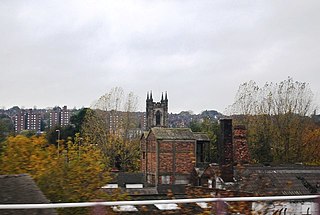
Stoke-on-Trent is a city and unitary authority area in Staffordshire, England, with an area of 36 square miles (93 km2). In 2022, the city had an estimated population of 259,965. It is the largest settlement in Staffordshire and is surrounded by the towns of Newcastle-under-Lyme, Alsager, Kidsgrove and Biddulph, which form a conurbation around the city.

Ebbw Vale is a town at the head of the valley formed by the Ebbw Fawr tributary of the Ebbw River in Wales. It is the largest town and the administrative centre of Blaenau Gwent county borough. The Ebbw Vale and Brynmawr conurbation has a population of roughly 33,000. It has direct access to the dualled A465 Heads of the Valleys trunk road and borders the Brecon Beacons National Park.

Burslem is one of the six towns that along with Hanley, Tunstall, Fenton, Longton and Stoke-upon-Trent form part of the city of Stoke-on-Trent in Staffordshire, England. It is often referred to as the "mother town" of Stoke on Trent. The population of the town was included under the Burslem Central ward and had a population of 6,490 in the 2021 Census.
Etruria is a suburb of Stoke-on-Trent, Staffordshire, England.
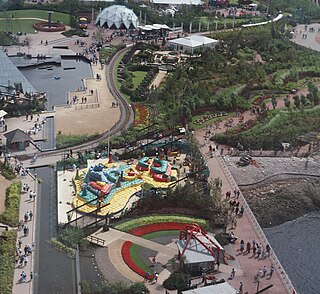
The national garden festivals were part of the cultural regeneration of large areas of derelict land in Britain's industrial districts during the 1980s and early 1990s. Five were held in total – one every two years, each in a different town or city – after the idea was pushed by the Conservative environment secretary Michael Heseltine in 1980. They were based on the German post-war Bundesgartenschau concept for reclaiming large areas of derelict land in cities, and cost from £25 million to £70 million each. They reclaimed the contaminated former sites of large industrial concerns such as steelworks.
Festival Park may refer to:

The Ebbw Valley Railway is a branch line of the South Wales Main Line in South Wales. Transport for Wales Rail provides an hourly passenger service each way between Ebbw Vale Town and Cardiff Central, and an hourly service each way between Ebbw Vale Town and Newport.

Rogerstone railway station is a station on the Ebbw Valley Railway in the community of Rogerstone in Newport, south Wales. The station is situated ½ mile north of the original station on the site of former rail sidings. The station is within the Afon Village housing development. Access to the single-platform station and associated car park is off Lily Way.
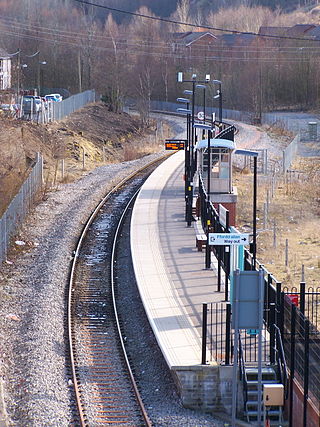
Ebbw Vale Parkway railway station is a station on the Ebbw Valley Railway in Wales. The station opened on 6 February 2008 when services to and from Cardiff Central commenced after 46 years of being a freight-only line. A northwards extension of the line to a new terminus at Ebbw Vale Town opened on 17 May 2015, which accounts for the drop in usage in 2015–16. A direct service to Newport was expected to commence in 2018 following double-tracking and re-signalling works between Aberbeeg and Crosskeys, but this has now been pushed back to 2021.

Ebbw Vale Town railway station serves the town centre of Ebbw Vale in Blaenau Gwent, Wales, serving as the terminus of the Ebbw Valley Railway.
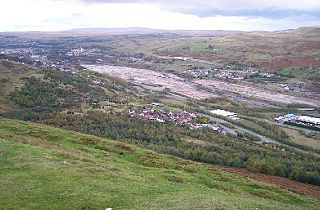
Ebbw Vale Steelworks was an integrated steel mill located in Ebbw Vale, South Wales. Developed from 1790, by the late 1930s it had become the largest steel mill in Europe. It was nationalised after World War II. As the steel industry changed to bulk handling, iron and steel making was ceased in the 1970s, and the site was redeveloped as a specialised tinplate works. It was closed by Corus in 2002, but is being redeveloped in a joint partnership between Blaenau Gwent Council and the Welsh Government.
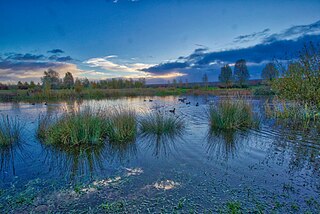
Glan Llyn is a mixed-use community development south-east of Newport, South Wales, at the western end of the former Llanwern steelworks, on the A4810 road at the edge of the Caldicot Levels.
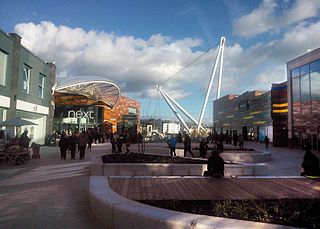
John Frost Square is a large public space in the centre of Newport, South Wales, named after the Chartist leader, John Frost. It was redeveloped as part of the Friars Walk shopping and leisure complex in 2014 and 2015.

The Ebbw Vale Garden Festival Funicular was a funicular railway built to carry visitors around the Ebbw Vale Garden Festival in 1992.

Gwent Archives is the local records office and genealogy centre, based in Ebbw Vale, South Wales for the historic county of Monmouthshire. It covers the modern local authority areas of Blaenau Gwent, Caerphilly County Borough, Monmouthshire, Newport and Torfaen.

Waun-Lwyd or Waunlwyd is a village in the Ebbw Valley in Blaenau Gwent. It belongs in the community of Cwm.

Ebbw Vale bus station, also known as Inner Bypass, is a bus terminus located in the town centre of Ebbw Vale, South Wales.

Georgetown is a village in the Sirhowy Valley in Blaenau Gwent. It belongs in the ward of Georgetown.
Llan-dafel is a village in the community of Cwm, in the Ebbw Valley in Blaenau Gwent.

Sirhowy is a village in the Sirhowy Valley and the county of Blaenau Gwent.




















